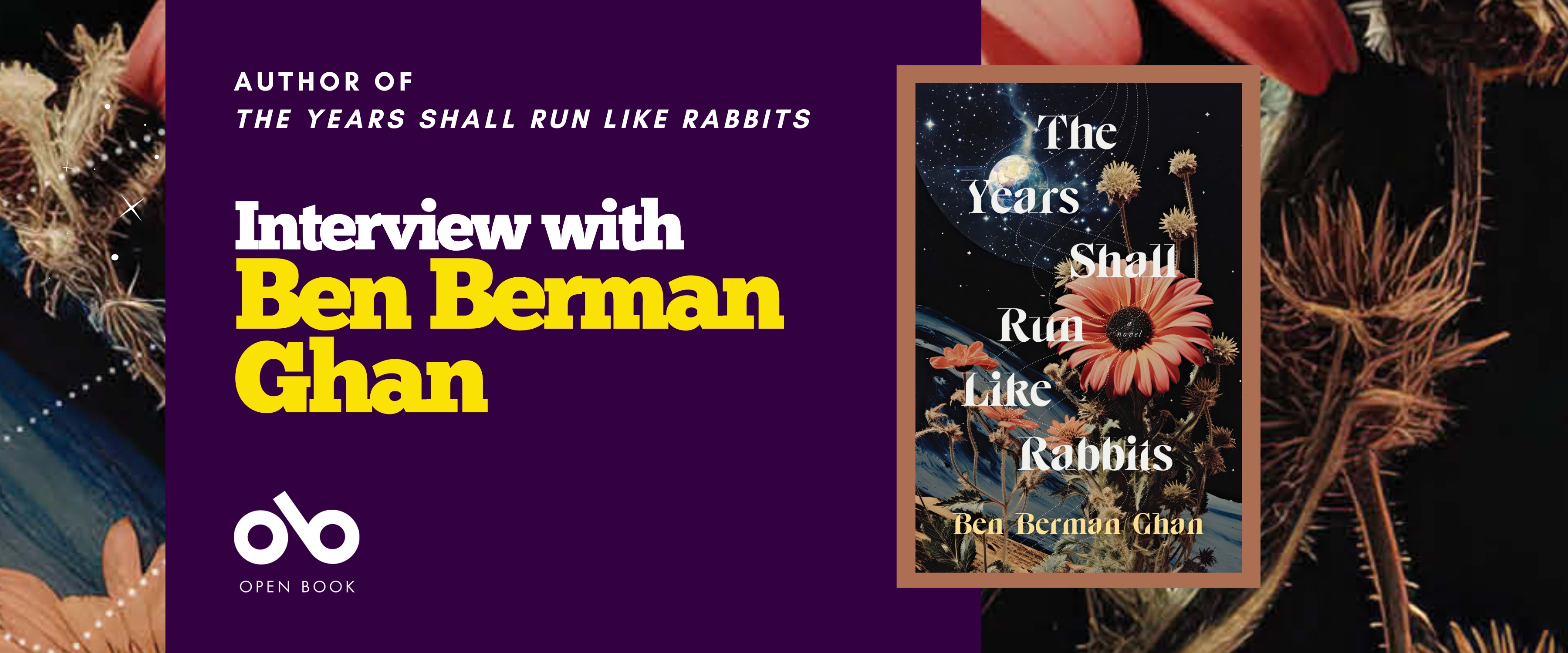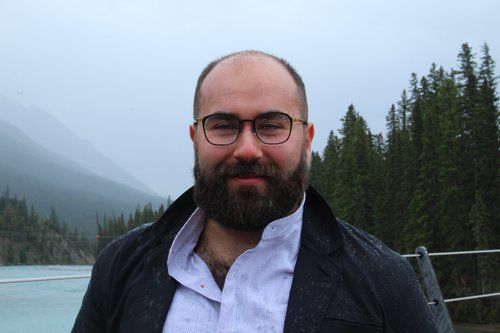Lunar Forests, Interplanetary War, and Cyberpunk Heroes Are Just the Beginning in Ben Berman Ghan's Debut Novel
How does an author ponder the important questions of our time while creating a speculative, fictional world that hums with intelligence and humanity? It's a tall order, but one that author Ben Berman Ghan is more that willing to take on.
In Ghan's debut novel, The Years Shall Run Like Rabbits (Wolsak and Wynn), we begin in 2014 where a winged alien sows the seeds of a space forest on the moon. Then the story shifts ahead to lunar colonization, the resulting war with alien beings, a powerful cyborg mind that has protected Toronto from the worst of the conflict, and the eventual recreation of humanity. To say that the novel is ambitious and wildly inventive would be a substantial understatement.
With wonderful prose and strong characters binding all of this together, the author contemplates the present moment that we live in, and poses important questions about the future of the world.
We're very happy to delve further into this spectacular debut, and share this Long Story Novelist Interview with Ben Berman Ghan today on Open Book!
Open Book:
How did you choose the setting of your novel? What connection, if any, did you have to the setting when you began writing?
BBG:
While there are multiple settings in the novel— The Rocky Mountains, a lunar replica of London England, a lonely space station, the craters of Mars — but it returns again and again to Toronto, which was the city I grew up in, and the city I wrote much of the first draft of the novel in.
My relationship with Toronto is complicated; I love it, I hate it, I know it, I belong to it, and I left it. It’s hard not to love a city so full of bookstores and art and incredible people working tirelessly toward empathy and community. It’s also hard to love a city that seems to hate its people and its communities so much, is so determined to drive out its poor, refuses to celebrate so much of what makes it unique and turns everything into the blandest of glass and plastic structure.
I have since left the city, and much of The Years Shall Run Like Rabbits was written with the knowledge that I would one day have to leave hanging over me. So hidden in this novel and its characters is an ode to my city and a goodbye to my city — for even if I return one day, it won’t be so exactly the place it used to be.
OB:
Did the ending of your novel change at all through your drafts? If so, how?
Your CanLit News
Subscribe to Open Book’s newsletter to get local book events, literary content, writing tips, and more in your inbox
BBG:
Funnily enough, no! It’s strange, and I’ve never really reflected on it before, but for Rabbits, the end has always been the end. Nearly every chapter inside the book changed, often as I opted for the less grim option in the face truth that some of my original ideas were just too sad, and I think I was right for those changes. But the end for the world, for Daisy, for the ghosts and monsters haunting Toronto, was always coming, even when I didn’t know how to get there.
However, there is a secret ending beyond the novel's end, an epilogue that’s always lived in my heart— redemption for Made, the little sentient toaster, as a new shiny body roles out of a dark and glittering vault on Mars. I may write that down, at some point, and simply share it for everyone to see, either on my website, or little printed pamphlets that I slip into the novel like bookmarks at readings. But it didn’t belong within the text that ends Rabbits, that ending will only for Daisy
OB:
Did you find yourself having a "favourite" amongst your characters? If so, who was it and why?
BBG:
The Years Shall Run Like Rabbits is Daisy’s novel, even when the story isn’t with her, but when I set out to write this story, I didn’t really know that! She came to me first as that perfect cyberpunk protagonist. I knew she would return throughout the book, but she was meant more as a cypher than a character — a vehicle to move the plot, to change the world. Rough, taciturn, focused and violent. Daisy was a cyborg with no personal history, no past, and no life of her own. Her role was almost that of the police detective, arriving in a new city to solve a crime. Daisy’s story was always one of revelation and radicalization — the agent of the state who turns her back on the state.
But in those early pages I found myself finding her, finding the character beneath the façade, and I knew I could not let her go. I found, despite myself, a romance lying in wait within the cyborg. I found a love the character I just could not shake, in her refusal to surrender herself to the thoughtlessness and the cruelty she had been assigned to, in her dedication to hold onto her sense of self in the face of so much doubt.
Throughout the novel, Daisy dies many deaths. She lives in many bodies. She becomes many different things other than that cold figure who first came to my imagination, and she becomes many different people in the process. An activist, a lover, a victim, a perpetrator, a savior, a partner, a monster.
Like many of us, Daisy is going through some changes. She’s trying to figure out who she used to be. She’s trying to figure out who she’s becoming. She’s trying to find a place for what she cares about and what she loves.
I love Daisy because in her small way, she’s me — she is my stubbornness, my obstinance, my anger at the world, my need to be loved, and my need to know myself— and she’s everyone else I know, too.
She might even be you.
OB:
If you had to describe your book in one sentence, what would you say?
BBG:
Death is not the end.
OB:
Did you do any specific research for this novel? Tell us a bit about that process.
BBG:
This book was informed by many places, both literary and critical. I’m not a SciFi writer in that hardest sense; there is no technical element at play within my writing, where the space travel is based on magical thinking and time travel is grounded only in poetics and riddles.
But there was still a lot of reading to do, all the same. The practice of literature is an ongoing conversation between many people at great distances, and in no genre is that conversation sharper or more refined than science fiction. So I turned to contemporary works of SF that I felt I would be in conversation with in some small way; by such authors as Ted Chaing, Nnedi Okorafor, Annalee Newitz, Jeff VanderMeer, Larissa Lai, Ken Liu, Matt Bell, and so many others. Additionally, this work wouldn’t have been possible without exposure to contemporary philosophers. Donna Haraway’s The Cyborg Manifesto and Timothy Morton’s Humankind were certainly heavy on my mind when crafting the early pages of this narrative. I often find myself in a bind in my chosen mode of living, as someone who has elected to read a lot of very heavy theories in his life, and yet I cannot concisely describe it or easily understand it. I cannot, in this interview, concisely explain Haraway’s conception of the cyborg or Morton’s explanation of Queer Ecology. But I could explore those ideas in about 310 pages, which is what I’ve tried to give to the world in Rabbits.
OB:
Did you celebrate finishing your final draft or any other milestones during the writing process? If so, how?
BBG:
Yes! Once the contract was signed and the ink had dried and the date was set, I elected to get a tattoo from the novel — with the most natural choice seeming to be the colossal whale that appears in the sky, having come all the way from the end of the universe. I went to Ketzia Kobrah at Witch Hazel Tattoo in Toronto, and she did a wonderful job placing planets and nebulae within its body along my right arm. It’s a piece I’m really fond of, and I am now in the very happy position of trying to think what the next piece will be for my next book. This will become a tradition for me, I think. If you encounter me as an old man with my body painted in beautiful designs, that just means that I will have written many, many books.
OB:
Who did you dedicate your novel to, and why?
BBG:
This novel is dedicated to my wife Margaryta, who I love and who kept me writing when I wanted to chuck my materials out the window. She enjoys stories that are wild and strange, and so I have worked here to make something wild and strange enough to delight her.
_____________________________________________
Ben Berman Ghan is a writer and editor from Toronto, Canada, whose prose and poetry have been published in Clarkesworld magazine, Strange Horizons, the Blasted Tree Publishing Co., the /tƐmz/ Review and others. His previous works include the short story collection What We See in the Smoke. He now lives and writes in Calgary, Alberta, where he is a Ph.D. student in English literature at the University of Calgary. You can find him at www.inkstainedwreck.ca.





